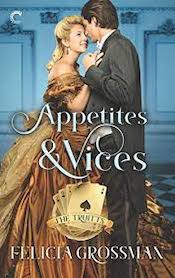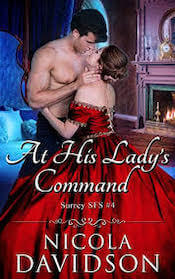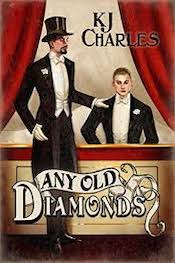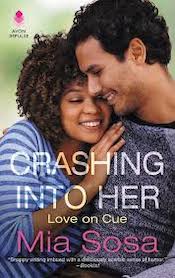Kissing Books: The case of the secret trope
Every month, Olivia Waite pulls back the covers, revealing the very best in new, and classic, romance. We're extending a hand to you. Won't you take it? And if you're still not sated, there's always the archives.
“She wasn’t the kind of woman who…”
And just like that, my shoulders are up around my ears.
They tell you romance is easy to write because the ending is a given, when in fact the opposite is closer to the truth: romance is difficult to write well because every reader’s standards for being persuaded to believe in the happy ending are unique and painfully particular. I’m not just talking about the big tropes: your marriages of convenience, your enemies to lovers, your small town prodigals come home to make good.
No, I’m talking about those tiny little echoes on the level of the sentence. Ordinary statements that would never stand out until you’ve read them in hundreds of different romances. The secret tropes.
They can make or break your romance in under twenty words.
I have taken to calling these phrases caltrops, and I perversely enjoy collecting them. Because I enjoy tracing patterns, even when the patterns themselves aren’t necessarily pleasing.
And now I get to enjoy ruining them for you, too.
A partial list of romance caltrops:
The Kind of Man/Woman Who: Generally followed by something that can range from mildly stereotypical to outright bigoted or transphobic. But anything that comes after this is going to be irritating, especially when it’s summing up women, because long experience in a sexist world has taught me that dividing women into kinds implies that one kind is going to be Good and the other kind Bad. Kinds of women = someone is looking for an excuse to do something shitty. “Well, I would never call a Good Woman a bitch—but my ex-girlfriend is a Bad Woman, so let’s point out her physical shortcomings in the most vicious way possible and expect the reader to cheer me on because breast implants, as though that is at all a logical chain of reasoning.”
Any Man/Woman Would: The character is about to declare something Inherently Masculine or Inherently Feminine! Usually without this opinion being sufficiently interrogated by the text! These are Rules we are supposed to Accept, for Reasons, and it chafes even in throwaway lines. “Any woman would find the Duke of Burlypants desirable.” Really? Even the queer ones? Or the happily married ones? Or even just the ones who would much rather flirt with lanky Viscount Sardonic over there on the other side of the ballroom? People have different tastes in people. This caltrop places shared gender identity in place of proper character development: I don’t care what Every Other Woman wants—show me what this woman finds irresistible. That’s what I’m here for.
Getting it Out of Their System: Truth be told, I love this one. One or both characters decide to give in to the attraction, thinking that once they’ve scratched the itch it will go away and no longer trouble them. It never works. Never once in all my years of romance has a one-time thing gotten someone out of someone else’s system. Basically, if you are in a romance novel and you think about getting someone out of your system? Ta-da, you’re married now! Enjoy this entire bouquet of babies.
For Their Own Good: At some delicate decision moment in the plot, one character will decide to keep an important secret from another “for their own good,” and I start to grumble and snipe at everything they do next. A lot of readers really dig that kind of secrecy and internalized angst, and more power to them; me, I anticipate the unknowing character feeling hurt and betrayed and it’s a rare book that can make that experience pleasureable for me. Variations include: “it probably won’t come up again,” “it’s too late to say anything now and bringing it up would be awkward,” and the lazy writing of “the other character has now stormed off under a misapprehension so I guess I can’t tell them.” Especially irritating when a hero does it, because I worry they’ll be too easily forgiven for the lapse.
The No-Other-Woman Bed: I’ve talked about this on my own blog before, but it’s worth revisiting because if there’s one phrase I’d most like to ruin, for no good social justice reason, it’s this one. Our hero (it’s always a hero) has finally opened his luxurious bedroom to the heroine (it’s usually a heroine, though it’s entirely possible I’m just not widely enough read in m/m to have seen this caltrop come up there). And there, drawing the eye like a magnet, is the Bed—a bed which no other woman, the hero’s POV tells us, has been permitted to sleep or fuck in. Let’s face it: this is a way of letting the hero metaphorically give his virginity to the heroine, without sacrificing the fantasy of his sexual prowess. He’s super-good at sex—but he’s never had sex right here in this limited slice of geography! That means the heroine is by definition special, because she’s the first! Weirdly, this faux-virginity-taking still leaves the hero in a position of power. It’s a favor, don’t you see? Spare me.
This month’s romances all feature characters dealing with disappointment: thwarted expectations, past hurts, failures, and betrayals. Not everything in the past is necessarily fixable in the present. Sometimes we have to be content with acknowledging the pattern. Sometimes that’s the only way forward.

Appetites and Vices by Felicia Grossman (Carina Press: historical m/f):
Most American historicals I’ve read cluster either around the Civil War or the settlement of the West—but there’s no better way to break that streak than with this strange, fine novel about a gorgeous, fat Jewish heiress and the charming, traumatized opium addict she gets fake-engaged to.
When we meet Ursula Nunes, she is in an upstairs hallway on the verge of tears because her best friend Hugo is explaining that his family refuses to let them wed. Ursula is not in love with Hugo, but they’ve been friends forever and they both saw marriage to one another as an escape from marrying anyone else (Delaware society being unusually full of overbearing fathers and poisonous debutantes). Hugo returns to the party—and Ursula is approached by Jay Truitt, an upper-class son generally considered to be a feckless womanizer, and who, of course, heard everything. He offers to pretend to be Ursula’s fiancé to spur Hugo’s family to change their mind (the Truitts being almost too upper class for the upper classes)—she can then break it off with Jay, who will use being quote-unquote heartbroken as an excuse to run far away and avoid his terrifyingly disappointed father.
Let’s be clear: this is a dumb, dumb plan, and I adore it. Fake engagements are one of those unrealistic romance tropes that I simply eat up—and this one does more than the usual amount of heavy lifting. As our fake couple socializes, they also start to notice one another’s better qualities: Ursula is clever and steely as well as sensitive, and Jay’s charm hides a profound gift for reading people, and a strong moral sense thrown perilously off by personal tragedy and addiction. (Which is, I should add, presented as a terrifying disease and not a quirk standing in for emotional depth. I was very, very worried for Jay in this book.) This is one of those lovely, lonely stories where the characters think so highly of each other, and so lowly of themselves; the contrast is an exquisite ache. The voice is a little eccentric, like classic Judith Ivory, all glints and refractions and implications. And if, at the end, it is a little too generous with the redemption (some of the side characters needed a little more shouting at, in this reviewer’s humble opinion), this is the most forgiveable kind of flaw. Ursula’s arc in particular more than makes up for it: she goes from a trembling, sobbing mess to a give-no-fucks fox without ever losing her sense of herself, and it’s bliss to watch.
She emitted a loud, sniffing, sigh. “Since we have no intention of being lovers then I don’t see what the quandary is. You’re not attracted to me and I’m not attracted to you, but I suppose there is propriety. I shall change.” He closed his eyes, his body throbbing. If she only knew. He listened for the door before relaxing his shoulders. He adjusted the lock. Perhaps he should barricade the door as well.

At His Lady’s Command by Nicola Davidson (self-published: historical f/m):
Remember the super-angsty, Gothic, Wuthering Heights-level firestorm that was The Duke I Tempted by Scarlett Peckham?
This story is the mirror universe of that: a careful, caring, sweetly earnest femdom historical with an upper-class heroine, Lady Portia, and a lower-class bodyguard hero, Captain Denham (swoon!). The writing is charming, very sexy and very sincere, and I had no trouble getting through it, but—the memory of the Peckham book is strong and the contrast really makes evident what I found dissatisfying in both stories.
The first book was intensely, unreservedly Gothic. At His Lady’s Command is firmly in melodrama territory: we have sniveling relatives, neglectful fathers, sinister dukes, an heiress in peril, a loyal ex-soldier, secret aristocratic lineages, and orphanages on the brink of being closed by cruel peers. Mustaches are twirled and lovers on the brink of disaster wrap one another in desperate embraces. It’s very charming, but—I cannot believe I am about to write this—I would have liked a few more very explicit sex scenes, or a few more plot twists, or a little of both. As with The Duke I Tempted, I was left mostly but not entirely pleased: the former was too angsty, and this one not angsty enough. I feel like a femdom Goldilocks, going from book to book and finding each one lacking in some trivial way.
But my biggest critique is that Lady Portia, a lady of mature years and strong opinions, an absolute hellion, a domme, and the founder of the Surrey Sexual Freedom Society (not nearly as anachronistic as many readers might assume)…never really takes action outside of the bedroom. The character as described is a terror to men of any station—and yet a mere proclamation from her crappy brother is enough to get her playing the docile bride-to-be and entertaining a host of horrible suitors. Even though she is old enough he can’t legally compel her marriage, even though she has wealthy and titled friends who would happily (and luxuriously) take her, she grits her teeth and goes along because…something about that orphanage? But again, wealthy friends and powerful peers are right there, offering you help and love and loyalty.
What exactly is keeping her a prisoner, except the shape of the plot?
“Oh, how awful, my brother has sold my house and demands I be chaperoned and wear pink and dance with his fortune-hunting cronies, it’s torture!” It sure is, but you could just … not do it? He can’t physically force you to dance, he can’t stuff you into the light pink gown, he can’t tie you to the chair while the maids put your hair in fussy curls. Or I mean, he could, but that would be a different story altogether. All Portia really has to do is grab a spare carriage and make for Scotland with her dishy, muscular, growly, eager-to-please silver fox bodyguard—seriously, Denham is what is colloquially known as *a snack*—et voilà, no more money or marriage problems! Instead, she laments her predicament and gets locked in a bedroom to be rescued. It all ends very happily, but I can’t help but wish she’d been permitted to help make that ending possible.
But men like him, ex-soldiers of dubious birth and no fortune were lucky to even be in the presence of women like Lady Portia. They didn’t dare wish for anything more. Not love. Not affection. Not marriage. Certainly not to be the man she commanded in the bedchamber as well as out of it.

Any Old Diamonds by KJ Charles (self-published: historical m/m):
Look, I know you all know how much I love a KJ Charles book by now, and I am staunchly resisting the urge to glom the backlist and tell you all at length how good they all are—but I am only human, and this is a queer Edwardian romance where an impoverished duke’s son and illustrator, Alec, attempts to get revenge on his cruelly neglectful father by hiring a pair of jewel thieves to rob the duchess’ diamonds. And then he makes the terrible but completely understandable mistake of fucking one of the jewel thieves.
It’s perfect. Absolutely, painfully perfect.
Thief Jerry Crozier is sadistic in all the best ways: an amoral, frank-speaking, wily sort of villain. I couldn’t have loved him more. He seduces Alec for the purposes of better controlling him in the chaos of the job to come—but he’s such a thoughtful top and Alec such a willing plaything that it’s no wonder before they’re both in way over their heads, emotionally speaking. The sparkly heist qualities of this book hide some sharp, painful edges, and Charles’ brutally gorgeous prose offers up gem after gem after gem to make the reader laugh and gasp and weep and swoon. Reading this book feels like getting away with something. To describe the precise turns of the plot is to risk spoiling the whole thing—you want the diamond itself, un-smudged by my greedy fingerprints. Suffice to say that this book seized me, seduced me, and left me feeling delightfully Noel Cowardish, languid and leisurely, and wishing I had a red silk smoking-jacket and a glass of aged port to hand.
”If you were hoping I’m secretly funding an orphanage or some such, I’m sorry to disappoint: I steal because it pays. Granted, I only steal from people who can afford to be robbed, but that’s not a moral principle. It’s just that poor people don’t have jewels.”

Crashing Into Her by Mia Sosa (Avon Impulse: contemporary m/f):
The road to true love never did run smooth—and it’s less smooth still when it’s being run by two snarky, skittish types who are desperately trying to do anything but fall for one another.
Eva is a fitness instructor new to LA, who is worried that the fitness classes she teaches aren’t quite enough anymore. Anthony is her best friend’s cousin, a devastatingly handsome stunt performer who teaches workshops for those looking to break into the industry. They hooked up at the cousin’s wedding three months ago, but neither is looking for a relationship and both have declared themselves almost allergic to dating. Really, can’t even say the word. Relationships are a terrible idea, people get hurt—just look at our parents!—and who has the time anyways, so what if we were just friends, you know, friends who go to food festivals and reggaeton concerts and drive-in movies together—friends who get jealous when one friend talks to an attractive person at a bar—friends who then storm out and argue and then pull one another into the truck by the belt loop and reach for the condom and oh no, where are all of these orgasms coming from?
Mia Sosa is one of those authors who does cocky-but-in-that-fun-way banter right (see also: Jamie Wesley, Shelly Laurenston), and there’s just the right amount of snap in the dialogue here to bring out the soft and tender parts once emotions come into play. There’s also a ton of laughter and banter in the sex scenes, which is always something I like to see—sex scenes are so much more fun when the people having them are having fun! In addition we have some top-notch competence porn (stunt training is hardcore), appetizing food descriptions, and zingy epigrams at the start of each chapter. It’s not quite a perfect book—it felt like solutions at the end came a trifle too quickly and easily—but it’s a solid wrap-up to what has been a very pleasing series.
Heat suffuses my face and the pounding at my temples resumes as I line up for the tackle. There’s so much I could say, but I go with an essential truth, a maxim every self-respecting person knows. “Anthony, sweetie, no dick’s that special.”
This Month’s Best First Line

Act Like It by Lucy Parker (Carina Press: contemporary m/f):
Almost every night, between nine and ten past, Lainie Graham passionately kissed her ex-boyfriend.
And there it is, one of the all-time greatest first lines in romance history. I am a sucker for first lines. It was the first line of Julia Quinn’s To Catch an Heiress in college that got me into romance seriously, back in my college years—to the point where my boyfriend at the time noticed, and found an episode of This American Life where they sent a reporter to the national conference of the Romance Writers of America. We listened to that segment on Valentine’s Day, and for the first time in all my years of paid and unpaid work I sat up and went: That is what I should be doing; that is where I want to be.
First lines will change your life.
This book is as superb as everyone says. Lainie is a legendary heroine: sharp, wry, and an honest-to-God diva, unapologetic about her temper and her tendency to throw small objects at people who have displeased her. She’s nice, and good, but not too nice to enjoy a good equal-opportunity shit-talking with her fake doing-it-for-the-publicity boyfriend. Hero Richard Troy is one of the greatest and most enjoyable assholes ever to grace a romance page: he’s blunt, he’s witty, he’s rude—but he’s rarely wrong. When he is, Lainie is swift to correct him in sharp terms he quickly comes to appreciate. Their chemistry is hilariously nonexistent at first—they gloriously, sincerely dislike one another—but one spark is all it takes for things to go up in proper flames. A cast of great side characters and wonderfully awful villains rounds things out: the cheating heartthrob ex, the heroine’s boisterous family, the conniving publicist, the envious television interviewer. I am beyond thrilled there are a whole series of these books for me to read next.
As a teenager, he’d been covered with acne, angry at life, and stuck at an all-boys boarding school. He was no stranger to sexual frustration. It was more than that. He was… God, he was bonding with her. Feelings—warm, strong, nauseating feelings—were springing up all over the place, unfurling in his chest, his gut, his groin. Sinking in deep with their little hooks.